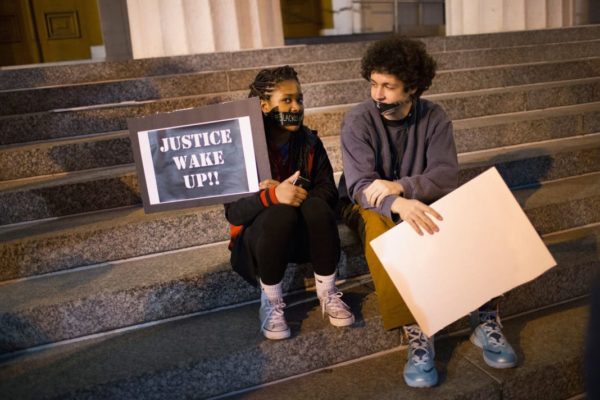
ST. LOUIS, MO – MARCH 14: Ferguson activists protest in front of the old courthouse on March 14, 2015 in St. Louis, Missouri. St. Louis and the nearby town of Ferguson have experienced many protests, which have often been violent, since the death of Michael Brown who was shot and killed by a Ferguson police officer in August. On Wednesday evening two police officers were shot while they were securing the Ferguson police station during a protest. (Photo by Scott Olson/Getty Images)
From top to bottom, America’s criminal justice system is truly in need of full reform — as proven by the millions of Americans currently sitting behind bars for minor infractions as basic as traffic violations. Often saddled with unfair bail practices and unrealistically high bonds, those without the funds to gain their freedom instead languish in jail.
One region that exemplifies this issue is the state of Missouri, particularly the St. Louis suburb of Ferguson. In the 102-page Ferguson Report, the Department of Justice found that the city had created and maintained “a haphazard bond system that results in people being erroneously arrested, and some people paying bond but not getting credit for having done so. Documents describe officers finding hundred-dollar bills in their pockets that were given to them for bond payment and not remembering which jail detainee provided them.”
At the time, the 2015 report painted a bleak portrait of Ferguson law enforcement, revealing “The City’s emphasis on revenue generation has a profound effect on Ferguson Police Department’s approach to law enforcement. Patrol assignments and schedules are geared toward aggressive enforcement of Ferguson’s municipal code, with insufficient thought given to whether enforcement strategies promote public safety or unnecessarily undermine community trust and cooperation.”
Missouri essentially had created two entirely separate judicial experiences, one that sent ripples through minority communities across the state. Just as prison has become a business, so has traffic enforcement and bail. Some departments required officers to meet quotas for tickets, warranted or not.
Ferguson’s population is just over 21,000, but in 2013 alone 32,975 non-violent arrest warrants were issued, and the bulk of those was for traffic violations. The small Missouri city earned $2.6 million in court costs and fines that year. Not to be outdone, in 2014 St. Louis County earned $52 million through similar practices.
Broken yet operable, the system continued in this manner largely unchecked until the shooting death of unarmed teenager Michael Brown by a Ferguson police officer. The shooting thrust the city into the national spotlight and brought thousands to pour into the streets in protest. The damning Ferguson report confirmed what many already knew, changes needed to be implemented.
Three years later, there are signs that legislation aimed at curbing these practices in the state may be making an impact, most notably Senate Bill 5, which curbs cities’ ability to raise revenue from municipal courts and set new conditions for those facing charges for non-violent offenses and minor traffic offenses. Implemented in 2015, the measure provided new guidelines that included “Limiting the fines imposed when combined with court costs to $300, prohibiting sentencing to confinement for the underlying violation (except for certain classes of violation) or failure to pay a fine (except when a violation of terms of probation), and requiring criminal case court costs to be assessed unless the defendant is indigent or the case is dismissed.”
It’s a shift that St. Louis University law professor Brendan Roediger described to the St. Louis Post-Dispatch as “Just like police have been told to write a lot of tickets, now they’re being told to slow down.”
Now cities like Ferguson are slowly starting to see results, with the Post-Dispatch reporting that traffic violations have since fallen drastically, as officers started issuing fewer tickets and courts collecting 57 percent less in associated court costs than in 2014. After years of tracking police productivity by metrics like the number of tickets issued, some Missouri officials have finally started pulling back, with areas like Ellisville shifting focus to the manner in which law enforcement interacts with businesses and the community.
For a number of municipalities in Missouri, change has come at their financial expense, which the Post-Dispatch report detailed as “The retreat was even more severe in the city of St. Louis, which has seen its municipal court revenue drop 70 percent over that time, to $3 million from $10 million.”
According to the outlet, “Some cities said they were instructing their officers to issue more warnings; others said they had de-emphasized traffic enforcement to put more officers on patrol in neighborhoods. Still, others said they were more mindful of burdening drivers with multiple tickets in a single stop, a common police tactic before events in Ferguson.”
But while many may be happy with the changes, some are not, including Pat Kelly, Executive Director of the Municipal League of Metro St. Louis, who argued, “It’s difficult to get people into court to pay their tickets now. You can’t issue warrants or have them arrested.”
Speaking with the Post-Dispatch about how municipalities across the state have been dealing with the notable decrease in revenue, he said some are asking “Why do we want to put our resources out on the highway? We’re not going to get most of the tickets because people aren’t mandated to pay them any longer.”
The greater St. Louis area’s criminal justice reforms have proceeded along parallel tracks of state and federal measures. After Missouri’s lawmakers responded to the region’s crisis with the successfully enacted Senate Bill 5 of 2015, President Obama’s Department of Justice obtained a consent decree imposing federal judicial oversight over the Ferguson Police Department. Similarly to steps it also took in Cleveland and Baltimore, the Justice Department sued to force Ferguson to end a litany of practices that violated the civil rights of the city’s mostly black residents. But President Donald Trump’s administration is signaling that it will be much less willing to police the police.
In the year since Attorney General Jeff Sessions issued a memo announcing that under the Trump-era Department of Justice “It is not the responsibility of the federal government to manage non-federal law enforcement agencies,” the DOJ has only hardened that position, threatening federal reforms won in communities like Ferguson, where activists have noticed and are on guard.
Last December Sessions rescinded 25 DOJ anti-discrimination guidance letters, including a guidance against imposing excessive fines on the poor. This blow at undermining one of the key reforms of the federal consent decree led Blake Strode, the executive director of the nonprofit St. Louis civil rights law firm ArchCity Defenders, to tell the American Bar Association Journal that Sessions’ move, “is certainly is not helpful to the cause of trying to bring an end finally to these practices.”
But the nation’s top lawyer does not have the law on his side in this rollback, however. Vanita Gupta, former Justice Department Civil Rights Division chief during the Obama administration, co-wrote the excessive fines letter Sessions rescinded. Gupta, who is now president of the Leadership Conference on Civil and Human Rights, told The New York Times, “The retraction of this guidance doesn’t change the existing legal framework. He can retract the guidance, but he can’t change what the law says.”
Even as the White House signals its indifference to intervene to uphold the civil rights of local citizens against the courts and police — Press Secretary Sarah Huckabee Sanders recently told reporters the Trump administration views a recent spate of police shootings of unarmed black men as “That’s something that we feel should be left up to the local authorities at this point in time” — for now, the law is holding the gains made against oppression in communities like Ferguson.


